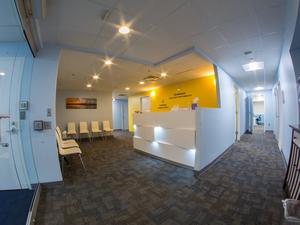
Dipanwita Das set out this year to drive Sorcero toward its next phase of growth — and her 3-year-old cognitive technology company is gaining speed.
The D.C. startup, which uses artificial intelligence to consolidate and interpret complicated scientific and medical data, is seeing roughly 600% year-over-year revenue growth and, now, crossing the $1 million in revenue mark. It’s “a milestone in almost any young startup’s life, so that’s a big deal for us,” Das said. The fast-growing business, armed with early validation from pilots and contracts, is ready for the next stage.
For Sorcero, that means going live this week with the first release of its platform. It involves making it available to engineers within its customers’ teams, and opening it to third-party developers in mid-November. The company has also sped up efforts to expand the language intelligence tools in its platform, making a more mature product that can serve a range of workflows, “rather than requiring us to build custom solutions for each customer,” said Walter Bender, its co-founder and chief technology officer. “This has put Sorcero in a good position to handle growth as we continue to receive interest from new customers and expand business with our existing ones.”
They’re all steps toward the founder’s ultimate goal of reaching true platform maturity, which would allow the developer world at large to use the software without Sorcero’s active participation and support, Das said. “But that is much further along in the roadmap.”
The company serves life sciences and insurance companies, as well as other STEM industry players, with seven contracts including with Swiss biotech and diagnostics giant Roche — which uses the platform to analyze updates in medical guidelines. Sorcero could expand into other industries beyond health care, testing its application in financial services and supply chain areas.
All of its customers work in industries “where scientific and engineering accuracy is paramount; there is no room for error,” Das said. Those companies could be working to get new drugs to market, writing regulatory applications or seeking how to improve clinical outcomes around diagnostics, for instance. So, she said, Sorcero’s platform makes it possible for them “to understand, access, distribute, share and monitor all of the technical content, internal and external to the company, that drives their business.”
During the Covid-19 health crisis, the startup launched Covidbase, a searchable database with verified information about the coronavirus. It also doubled down on recruitment, hiring vice presidents of engineering and product, a senior director of application engineering and others. In all, Sorcero has grown its team by two-thirds, adding nine people to its 16-person staff, and planning to reach 30 in total. That’s partially because the business has seen an increase in interest from clients “whose operations have been disrupted and are looking at how they can transform their document workflows,” Bender said.
To that end, Das said, “We cannot keep up with the pace of demand, which is a lovely place to be in, but it is a problem to be solved nonetheless.”
The business has raised $5.4 million to date including $1.2 million last year and another $3.5 million in June that Das credits with helping Sorcero to establish consistent revenue growth and speed up product development, she said. “It’s really allowed us to also bring on board the kind of executive team who can take us to scale.”
The business is now preparing to open its Series A round, which will be “definitely double digits,” Das said, declining to disclose an amount. That capital would position Sorcero to hire; specifically, to expand its infrastructure team, add more expertise to its AI team, hire sales executives and bring on implementation engineers — so, as contracts expand, the company could potentially install its systems into its customers’ cloud environments, for instance.
Sorcero isn’t yet profitable, Das said, though it’s shooting to break even in 2022. And that’s partially because “our customers’ expectations for what the platform should be able to do is ahead of even our own ambitions sometimes, and what we are finding is we’re having to build well ahead of buy,” she said.
Das launched Sorcero in August 2017 to bring understanding into AI software, she said. “Our whole assertion was: If it does not understand, it is not intelligent, and if it is not intelligent, it can’t be relied upon to transform critical business.”
Heading into 2021, her business will transition from reacting and responding to customer needs to, instead, proactively targeting its services to its customers, Das said. She’s a two-time DC Inno on Fire winner and 2020 Blazer with a background in international development and on the product side of other startups. That roster includes social impact consulting firm 42 Strategies, which she founded in 2014 and led for four years.




